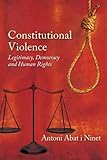Constitutional Violence : Legitimacy, Democracy and Human Rights / Antoni Abat i Ninet.
Material type: TextPublisher: Edinburgh : Edinburgh University Press, [2022]Copyright date: ©2012Description: 1 online resource (192 p.)Content type:
TextPublisher: Edinburgh : Edinburgh University Press, [2022]Copyright date: ©2012Description: 1 online resource (192 p.)Content type: - 9780748669547
- 9780748669554
- 364.1322 23
- online - DeGruyter
| Item type | Current library | Call number | URL | Status | Notes | Barcode | |
|---|---|---|---|---|---|---|---|
 eBook
eBook
|
Biblioteca "Angelicum" Pont. Univ. S.Tommaso d'Aquino Nuvola online | online - DeGruyter (Browse shelf(Opens below)) | Online access | Not for loan (Accesso limitato) | Accesso per gli utenti autorizzati / Access for authorized users | (dgr)9780748669554 |
Frontmatter -- Contents -- Preface -- 1 Introduction -- 2 Sovereignty and Constitution -- 3 Democracy -- 4 Legal Violence -- 5 Comparing Constitutional Violence -- Afterword -- Bibliography -- Index
restricted access online access with authorization star
http://purl.org/coar/access_right/c_16ec
If constitutional legitimacy is based on violence, what does this mean for democracy?Almost every state in the world has a written constitution and, for the great majority, the constitution is the law that controls the organs of the state. But is a constitution the best device to rule a country?Western political systems tend to be ‘constitutional democracies’, dividing the system into a domain of politics, where the people rule, and a domain of law, set aside for a trained elite. Legal, political and constitutional practices demonstrate that constitutionalism and democracy seem to be irreconcilable. Antoni Abat i Ninet strives to resolve these apparently exclusive public and legal sovereignties, using their various avatars across the globe as case studies. He challenges the American constitutional experience that has dominated western constitutional thought as a quasi-religious doctrine. And he argues that human rights and democracy must strive to deactivate the ‘invisible’ but very real violence embedded in our seemingly sacrosanct constitutions.Key FeaturesChallenges the legitimacy of constitutional systemsReveals how constitutions are sometimes violently enforcedProvocative case studies show how Ninet's theory is played out in practiceFind out moreRead and download the introduction for free on our website (pdf)"
Mode of access: Internet via World Wide Web.
In English.
Description based on online resource; title from PDF title page (publisher's Web site, viewed 29. Jun 2022)


